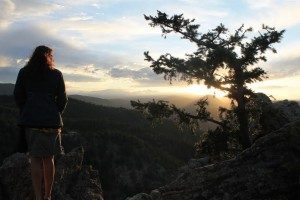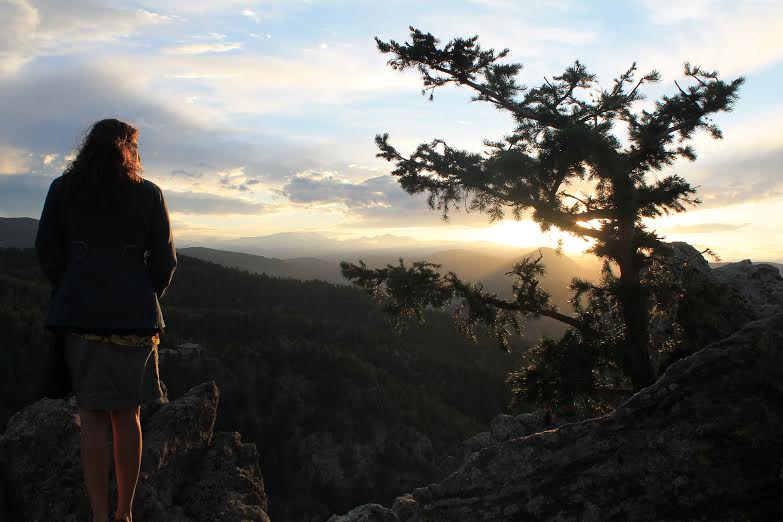
I discovered the world of Sustainable Development while in college in the beautiful Appalachian Mountains surrounding Appalachian State University. The idea of sustainable energy production/use, housing, and agriculture seemed like a no-brainer & an inevitable evolution for society… I also liked the fact that this discipline has far-reaching tentacles into many different areas of society/industry and offers many various career paths. The laser focused question, “what do you want to do for a living?” always seemed like a trap, set to box us into some narrow specialized cog in the assembly line of industrial civilization. I wanted to be many things: an explorer, an activist, a musician, an artist, a cook, a photographer, a writer, a father, a farmer, a philosopher, a builder, a designer, a teacher, and a student… I was afraid that defining myself w/ a single occupation would lessen everything else I wanted from life but I found comfort in the broad scope & solution-aspects of sustainability. As I continued my educational journey, I learned a lot about society, ecology, economy, & technology but many lessons, we learn outside of a classroom. One thing I was very sure of, I didn’t want to define my life purpose working in an industry contributing to suffering & exploitation of people & the environment. Money/salary drives many of our youth’s decisions about their path in life & while financial security is a noble goal, should we decide our purpose in society based primarily on the amount of money a job provides regardless of how happy it makes us or how exploitive it may be to others or the environment?
There’s an intrinsic value in getting up in the morning and knowing that your work is going to help others… or that your efforts contribute solutions to some of society’s problems… I feel there’s also a negative energy that comes with knowing that your work contributes to problems in society & not solutions. One of the principles of ecology states that everything is connected. When we contribute to the suffering of others or to the planet, we’re contributing to our own suffering… Because we can be rewarded for bad behavior with our economic system, many find themselves w/ more than enough resources but without the happiness that should accompany such success. Sustainability is a spiritual path… this isn’t to say that to be sustainable-minded, you must become a Pagan or renounce other belief systems, but discovering our connection to each other & nature can bring us closer to whatever version of God (or lack of a god) each of us have. Most religions teach us this selfless & caring disposition but it’s lost in the echo chambers & dogmatic chatter of apocalyptic group think.
Sustainability doesn’t divide groups & belief systems but provides a common ground that erases the imaginary borders & restrictions that society places on us. We are all humans living on earth and sharing the finite & renewable resources our planet provides. We, as humans need to start prioritizing our collective basic need for survival over the emphasis that is always put on economy. Of course modern society as we know it would cease to exist w/out economic systems which have become increasingly engrained & interconnected w/ most cultures & populations on the planet. It’s also true that our economic systems rely on natural resources & commodities which are all effected by a healthy environment. Fortunately, many sustainable-related technologies & products are becoming economically feasible & more profitable. In order for our species to continue for generations to come, we must not only create more incentives for sustainable development, but we must also create real incentives & accountability that eliminate the negative social & environmental effects of many corporate commodities & practices around the world. Many have heard of the Triple bottom line economic concept and other more equitable & accountable ways to make our economy more sustainable. We have solutions to most of our problems but until the collective power of a global community is fully recognized, sustainability will continue to take a back seat to powerful special interest profits and Plutocratic ideology.
There are chinks in the armor… the global polluters & exploiters have spent billions on politicians & misinformation campaigns but the word is getting out & more are starting to listen to scientists over politicians & industry front groups. We the people need to divest whenever possible from these negative forces… we need to support with our dollars & voices, companies that are responsible. We have to vote for sustainability in our political elections, both nationally & locally… We need to demand more public assets, not less. We need to use our tools such as social media to spread the truth about climate change & the exploitation of our political process by special interest groups who perpetuate exploitation & manipulation. We have to discuss tough topics w/ family & friends. We must fight for our survival… but w/ compassion & love because it’s all that’s ever really worked. There is always common ground… even w/ the ones that seem the furthest away. Find the common ground & grow from there… most of us really want the same things out of life. We all must push for more sustainable practices in our homes & workplaces… luckily, many sustainable efforts save much more money than they cost & therefore are easy business choices to make. We must make it very clear that this movement isn’t taking us back to dark caves but is propelling us forward with cutting edge technologies & an ethically clear conscience into a future where resources are used for collective social & ecological good instead of war & exploitation… To choose sustainability is to choose life & all the abundance it has to offer. Imagine what humans are capable of if we put our collective energy & resources toward a sustainability & a good quality of life for all.
BIO:
Heath Moody was born in Atlanta, Ga. & moved to Boone, NC in 1992 where he attended Appalachian State & studied Anthropology & Sustainable Development. After graduation, he wanted to learn the hands-on & practical side of sustainable technologies, he got his M.S. in Industrial Tech. & Appropriate Technology. Heath homesteaded some land outside of Boone w/ some other App State students and eventually built a cabin for him & his family. In 2005, he moved to Asheville, NC where he taught in the Construction Management & Carpentry programs at A-B Tech. In 2010, he helped the Dept. Chair develop the Sustainability Technologies program through a D.O.E. grant. He moved into the Department Chair position when Ken Czarnomski, the previous Dept. Chair retired in 2011. Today, the Sustainability Technologies program is self-supportive & attracts students from Western NC & beyond. The Construction Management & Building Construction Sciences programs also provide hands-on training for the construction of high performance buildings. He serves on the Board of Directors for the WNC Green Building Council and helps promote sustainable & affordable housing in the Asheville area.


